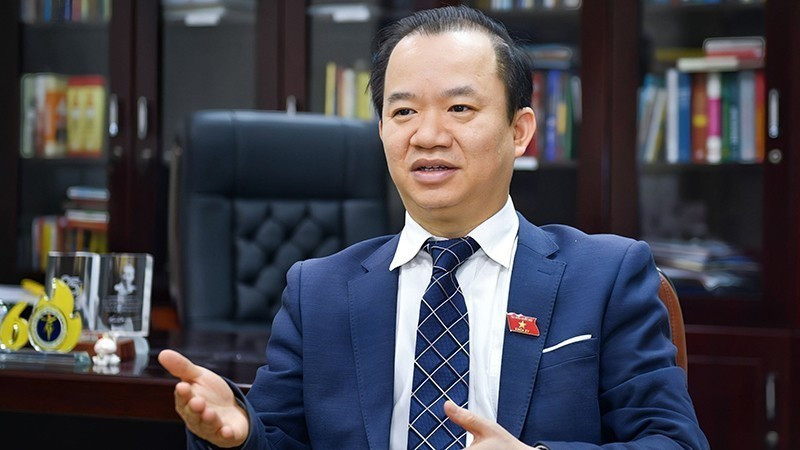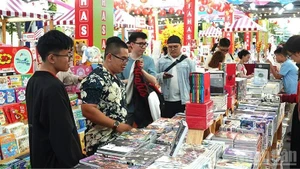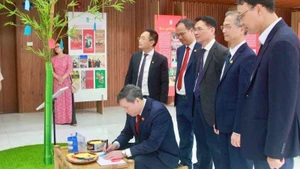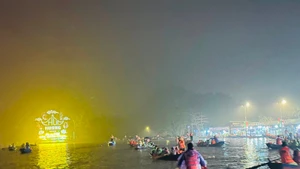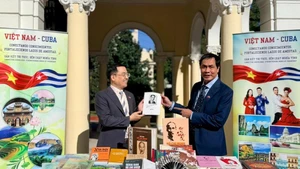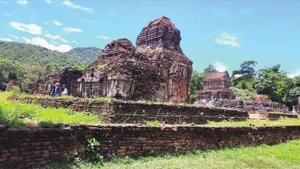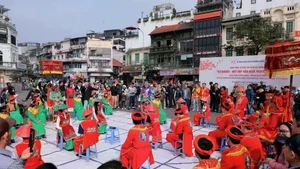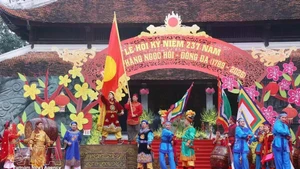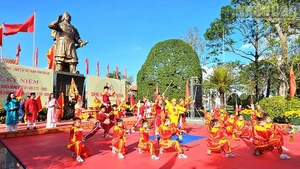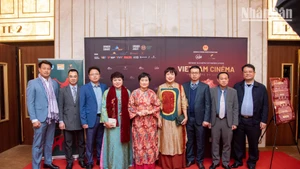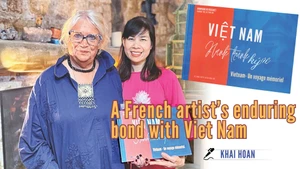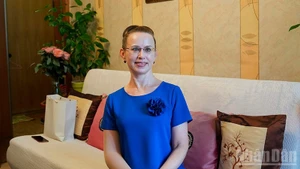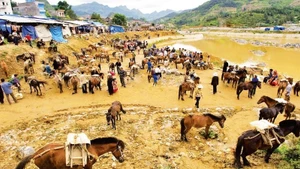The draft Political Report of the 13th Party Central Committee at the 14th National Congress of the Party emphasised the requirement of “building and developing an advanced Vietnamese culture imbued with national identity, synchronously founded on the system of national values, the system of cultural values, the system of family values, and the standards of Vietnamese people.” This is the inheritance of the spirit of the 13th Congress, and a stronger affirmation of the role of culture and people in the new era.
Putting culture and people at the centre of development
General Secretary To Lam emphasised: “Investing in culture is investing in the future, in the source of national strength.” This suggests a very clear policy requirement: culture is not only a supporting field but must become a pillar of development on par with economics, politics and society. Over the years, reality has proven that when culture and people are placed in the right position, national strength will be multiplied. It is important that culture cannot stand on the sidelines of development policy. Culture must permeate all planning and projects with a long-term vision and high standards. Putting culture and people at the centre is therefore not just a political declaration, but also a clear direction for action.
During the 13th Congress term, the country has recorded many important achievements in the fields of culture and human development. The draft Political Report affirms: “Cultural, human and social development has achieved very important results, with many aspects of progress; social security and people’s lives have been increasingly improved.” These achievements are clearly demonstrated in specific changes: many cultural institutions — from museums, libraries, and theatres to community cultural centres — have received investment attention, contributing to creating a richer spiritual living space for the people. Many large-scale cultural programs have aroused national pride, such as the series of celebrations of the 80th anniversary of the August Revolution (August 19) and National Day (September 2), or the recent national concerts attracting tens of thousands of young audience members, demonstrating the new vitality of culture in the hearts of the public.
In particular, in the international arena, Viet Nam’s cultural position has been strongly affirmed. Ha Noi, Da Lat, and Hoi An have become members of the UNESCO Creative Cities Network for design, while cultural values such as Thai xoe dance, Cham pottery art, or the Yen Tu-Vinh Nghiem-Con Son and Kiep Bac relic clusters have been honoured by UNESCO as world heritage sites. These not only indicate international recognition of the quintessence of our national culture but also opens opportunities for the development of creative industries and cultural tourism — fields that are gradually becoming new driving forces for the economy.
However, the draft Political Report frankly pointed out: “Culture has not really become a resource, an endogenous strength, nor a strong driving force for development. The system of national values, the system of cultural values, the system of family values and the standards of Vietnamese people have been slowly clarified… Investment in culture is still low and scattered… The cultural environment is not very healthy; social ethics still show signs of degradation.” In reality, village and commune cultural houses are still closed in many remote areas, lacking practical activities; the gap in cultural enjoyment opportunities between urban and rural areas has not been overcome. In cyberspace — which is increasingly becoming the “second home” of young people — the phenomenon of fake news, violent language, and toxic content is still widespread, and there is no solution strong enough to build a healthy environment. Therefore, the draft documents of the 14th Congress need not only to acknowledge the achievements, but more importantly, to focus on addressing the gaps, turning the aspiration to build a comprehensive Vietnamese person into reality with more specific, strong, and synchronous policies.
Breakthrough requirement from the 14th Congress: Building comprehensive Vietnamese people
The achievements and limitations in the recent period pose an inevitable requirement: The 14th Congress documents must consider building a comprehensive Vietnamese person as a strategic breakthrough. The draft Political Report clearly states: "Building and developing an advanced Vietnamese culture, imbued with national identity, synchronously founded on the national value system, cultural value system, family value system, and Vietnamese human standard.” The important new point is that this time, the value system is not only stated in general but has been affirmed as an orientation that needs to be specified and integrated into education, communication, and social movements.
Speaking at the ceremony to celebrate the 80th anniversary of the cultural sector’s tradition (August 28, 1945 - 2025), General Secretary To Lam emphasised: “Culture builds the image of the nation and shapes the national value system and the value system of the Vietnamese people in the new era: patriotism, humanity, solidarity, honesty, responsibility, creativity, discipline, and aspiration.” Building a well-rounded person means first of all improving intelligence, morality, physical strength, and skills. This requires the education system to continue to fundamentally innovate, from the way of teaching letters to the way of teaching people, nurturing the spirit of creativity and awareness of global citizenship. Along with education, it is necessary to pay attention to maintaining a healthy cultural environment. A safe cyberspace rich in human values will be the “second school” of the young generation. Therefore, developing digital culture, building a code of conduct online, and supporting platforms for creating positive content are requirements that cannot be delayed.
Culture builds the image of the nation, shapes the national value system and the value system of the Vietnamese people in the new era: patriotism, humanity, solidarity, honesty, responsibility, creativity, discipline, and aspiration.
General Secretary To Lam
Another breakthrough is to link human development with the development of cultural industry and creative economy. When the film, music, design, online game industries, etc. are invested in systematically, they not only create jobs and contribute to GDP but also shape aesthetic taste and behavioural standards and foster cultural pride. In addition, building a comprehensive Vietnamese person is also associated with enhancing the role of intellectuals, artists, businessmen, and youths. They are the pioneering force in spreading the value system, creating new products and models, and at the same time inspiring the community.
Turning aspirations into action
To comprehensively develop Vietnamese culture and people to truly become a strategic breakthrough, the 14th Congress document does not stop at orientation, but needs clear solutions and implementation mechanisms. Here are some recommendations:
First, concretise the Vietnamese value system in the new period. The national, cultural, family value systems and Vietnamese human standards have been identified in the draft document, but they still need a roadmap and implementation tools. It is necessary to deeply integrate these values into the general education program, into mass media activities, and especially into grassroots movements.
Second, invest appropriately so that culture is on par with the economy. Investing in culture is investing in the future, in the source of national strength. This requires the 14th Congress documents to be accompanied by specific targets on the proportion of the budget for culture as well as mechanisms to encourage socialisation and public-private cooperation in building cultural institutions. Without a guarantee of resources, the goal of “culture on par with economics and politics” will be difficult to put into practice.
Third, strongly develop the cultural industry and digital culture. In the period of integration and digital transformation, the cultural industry is not only an economic sector, but also a “soft power” that affirms national character. The document should stipulate more clearly the policy of prioritising key industries such as film, music, design, and online games, and at the same time building a safe and healthy digital creative ecosystem. A code of conduct on cyberspace, along with a mechanism to support platforms for creating content with Vietnamese identity, will help protect young people from negative foreign cultural flows.
Fourth, care for and promote the role of the cultural elite. People are the centre of culture, and the direct force in creating culture is the team of intellectuals, artists, businessmen, and youths. The document needs to more clearly mention policies to promote talents in the field of culture and art, encourage creativity, protect copyright, and create conditions for young people to engage in creative professions.
Fifth, promote cultural diplomacy and promote the national image. In the context of deep integration, culture is an important diplomatic channel to enhance the country's position. The document should have stronger commitments to building a national cultural brand, organising international cultural and artistic events, and proactively participating in UNESCO’s global creative networks. This is the way to turn culture into a “common language” for Viet Nam to engage in dialogue, cooperate, and spread values to friends around the world.
The 14th National Party Congress is approaching, bringing with it the aspiration to open a new era of development for the country. In that aspiration, culture and people are not only the spiritual foundation, but also the strongest internal resources for Viet Nam to rise up. The 14th Congress documents, therefore, are a strong commitment to the people: taking people as the root and taking culture as the foundation to build a rich, civilised, and happy Viet Nam, standing firm with the times.
